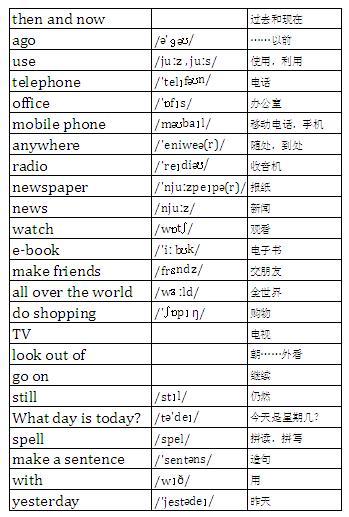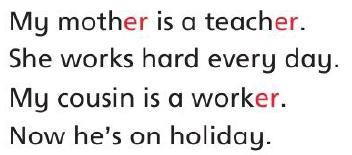译林版六上u4知识点(译林版6AU4)


then and now 过去和现在
make friends 交朋友
do shopping 购物
go on 继续
six years ago 六年前
read newspaper 读报纸
read e-books 读电子书
mobile phone 移动电话,手机
all over the world 全世界
look out of…… 朝……外看
make sentences 造句
in the office 在办公室里
watch news 观看新闻
make a sentence with……用……造一个句子
重点句子1、Six years ago, Mike could read and draw, but he could not write.
六年前,迈克能读书、画画,但他不会写字。
<could 是情态动词can 的过去式,could 后面直接接动词原形。could not 的缩写形式是 couldn't.>
<could 还表示“允许”,指委婉客气地提出问题或陈述看法。>
2、Now he can do many things.
现在他会做很多事。
<can 是情态动词,有一定的词义,但不能独立作谓语,后面接动词原形。>
<情态动词can没有人称和数的变化。>
<将含有can的句子改为否定句时,在can后加否定词not. can 的否定形式是cannot, 可缩写为can't;改为一般疑问句时,将can提到句首,句末用问号。>
<can 可以表示能力,意思是“能,会”,也可以表示可能,常用于否定句和疑问句中。>
3、He used the telephone at home and in the office to call people.
他在家和办公室用座机打电话给别人。
<use A to do B:用A去做B,表示目的;use A for doing B:把A用于B,表示用途。>
< at home and in the office 说明了使用电话的地方;to call people说明了使用电话的目的。>
4、He can call people anywhere.
他可以在任何地方打电话给别人。
5、Thirty years ago, Mike's grandpa listened to the radio and read newspapers for news.
三十年前,迈克的爷爷通过听广播和读报纸了解新闻。
6、Now she has e-friends from all over the world.
现在她有来自全球各地的网友。
<all over the world,全世界。over表示“遍及”。有时all over the world可以和all around the world互换。后者倾向于表示以某一点为中心的四周,around表示“周围”。>
7、A: What day is today?
今天是周几?
B: It's Wednesday.
今天是周三。
8、A: Can you spell "Wednesday"?
你会拼写Wednesday吗?
B: W-e-d-n-e-s-d-a-y。
语法时间一、一般过去时用来描述过去的事情或者状态,如:
Two years ago, I couldn't write.
两年前,我还不会写字。
Thirty years ago, they listened to the radio and read newspapers for news.
三十年前,他们听广播和读报纸了解新闻。
二、复习和学习行为动词过去式的不规则变化,如:
am-was
is-was
are-were
can-could
do-did
eat-ate
fly-flew
get-got
go-went
see-saw
take-took
catch-caught
lose-lost
find-found
make-made
buy-bought
write-wrote
give-gave
have-had
bring-brought
wear-wore
become-became
come-came
meet-met
tell-told
say-said
read-read(同形不同音)
三、区分一般现在时和一般过去时的用法:
1、两个时态中的谓语动词不一样
☆在一般现在时的句子中,主语为第一、二人称时,谓语动词用动词原形;主语为第三人称时,谓语动词用第三人称单数形式。
☆在一般过去时的句子中,无论主语是什么人称,谓语动词用过去式。
2、两个时态中的时间状语不一样
☆在一般现在时的句子中,通常会出现always, usually, often, sometimes, never, every day等词或短语。
☆在一般过去时的句子中,通常会出现ago、 last year/……、 just now、yesterday等词或短语。
语音时间

字母组合“er”在单词中读音为/ə/,常见词有:mother, teacher, worker, sister, summer, winter等。
字母组合“er”读音为/ɜː/的常见词有:term等。
文化之窗★The Chinese invented the compass.
中国人(the Chinese)发明了指南针(compass)。
★The British invented the train.
英国人(the British)发明了火车(train)。
,免责声明:本文仅代表文章作者的个人观点,与本站无关。其原创性、真实性以及文中陈述文字和内容未经本站证实,对本文以及其中全部或者部分内容文字的真实性、完整性和原创性本站不作任何保证或承诺,请读者仅作参考,并自行核实相关内容。文章投诉邮箱:anhduc.ph@yahoo.com






